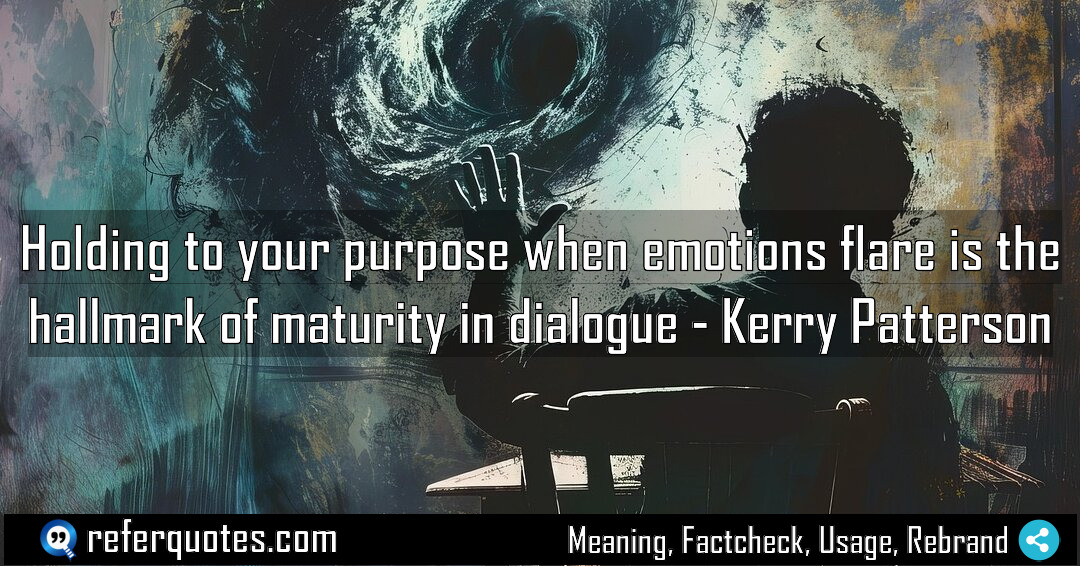Holding to your purpose when emotions flare is what separates the pros from the amateurs in tough conversations. It’s not about suppressing how you feel, but about not letting those feelings hijack the entire discussion. This is the real work of effective communication.
Share Image Quote:Table of Contents
Meaning
The core message is simple: true maturity in conversation is demonstrated by your ability to stay focused on your goal, even when things get heated.
Explanation
Let me break this down for you. We’ve all been there. Someone says something that just pushes your buttons, right? Your heart starts pounding, your face gets hot, and the only thing you want to do is win the argument or make them feel as bad as you do in that moment. That’s the flare. That’s the emotion taking the wheel.
But here’s the insider knowledge: the pros, the people who actually get things done and maintain strong relationships, they do something different. They feel that same surge, but they have this little mental pause button. They hit it. And in that split second, they ask themselves one crucial question: “What is my real purpose here?”
Are you trying to be right? Or are you trying to solve a problem? Are you trying to punish the other person? Or are you trying to understand them? Holding to your purpose is the anchor that keeps the conversation from capsizing in a storm of emotion. It’s the ultimate sign of strength.
Quote Summary
| Context | Attributes |
|---|---|
| Original Language | English (3668) |
| Category | Personal Development (697) |
| Topics | control (58), emotion general (105), purpose (186) |
| Literary Style | clear (348), philosophical (434) |
| Emotion / Mood | inspiring (392), lively (108) |
| Overall Quote Score | 82 (297) |
Origin & Factcheck
This gem comes straight from the classic business and communication book, Crucial Conversations: Tools for Talking When Stakes Are High, first published in the United States back in 2002. The authors are a powerhouse team of corporate trainers—Kerry Patterson, Joseph Grenny, Ron McMillan, and Al Switzler. You might see this quote floating around the internet attributed to generic “leadership” gurus, but its true home is in their work on high-stakes dialogue.
Attribution Summary
| Context | Attributes |
|---|---|
| Author | Kerry Patterson (35) |
| Source Type | Book (4032) |
| Source/Book Name | Crucial Conversations: Tools for Talking When Stakes Are High (35) |
| Origin Timeperiod | 21st Century (1892) |
| Original Language | English (3668) |
| Authenticity | Verified (4032) |
Author Bio
Kerry Patterson coauthors influential books that help people tackle tough conversations, drive change, and build accountability at work and beyond. He cofounded VitalSmarts (now Crucial Learning) and spent decades developing training that organizations implement globally. He earned a master’s degree from Brigham Young University and completed doctoral work in organizational behavior at Stanford, and he has taught and consulted widely. The Kerry Patterson book list includes Crucial Conversations, Crucial Accountability, Influencer, and Change Anything—bestselling titles that continue to shape modern leadership and communication practices.
| Official Website
Where is this quotation located?
| Quotation | Holding to your purpose when emotions flare is the hallmark of maturity in dialogue |
| Book Details | Publication Year/Date: 2002; ISBN/Unique Identifier: 9780071771320; Last Edition: 3rd Edition (2021); Number of Pages: 272. |
| Where is it? | Chapter: Start with Heart, Approximate page from 2021 edition |
